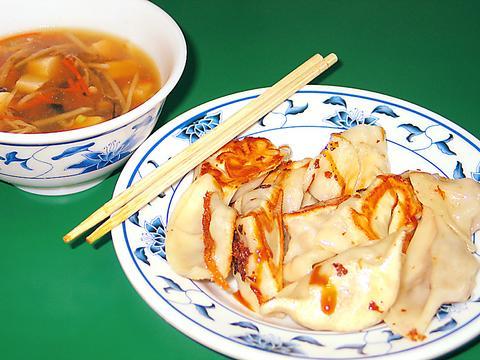Many people view a vegetarian diet as a healthy alternative to eating meat but not all vegetarians want to be healthy. Some, like their carnivorous peers, hunger for greasy fatty foods but satisfying that craving is not always so simple. It is a rare but celebrated occasion when you stumble upon an eatery, which offers veggie substitutes for popular artery hardening snacks.
Tian Wei is such a venture. Mr Tsai started the place two years ago and it has proven itself to be profitable, with a number of regular customers and a frequent queue of people waiting for tables.

PHOTO: DIANA FREUNDL, TAIPEI TIMES
Across the street from Taipei Main Station, heading west, Tian Wei is the first restaurant you see on a street lined with small vegetarian shops. Tsai offers something the others don't, a selection of deep fried, pan fried and re-fried items, which use soy oil in place of the commonly used pork oil.
Fried dumplings, steamed buns and radish cake are among the more popular choices, with a selection of vegetarian versions of meat- and seafood-based dishes such as oyster omelets (
The imitation-oyster omelet is prepared with mushrooms in place of oysters and can be made with or without eggs. Around 80 percent of the people in the restaurant were eating this. The base is made with a doughy pancake batter that has a chewy consistency and a slightly sweet flavor. It is served with a large helping of pink sweet-and-sour sauce, which is also used for the rice pudding and Taiwanese meat-less balls. Each of these can be ordered without sauce or on the side.
The pork rice pudding is similar to a sticky rice dumpling and is made with mushrooms, peanuts and tofu. Garnished with coriander and served without the sweet sauce this makes a tasty side dish that is quite filling, despite its small size.
Although there is a selection of rice, noodles and soup dishes, which can be found at most vegetarian restaurants, it is recommended you try something different. There is a choice of steamed, boiled or fried dumplings and -- having tried all three -- the fried is recommended. The hot-and-sour soup loaded with tofu, vegetables and flavor complements this dish nicely.
The most expensive meal on the menu costs NT$70 and includes a full set with rice, an imitation chicken or fish and three kinds of vegetables. An order of 10 dumplings costs NT$50.
The restaurant's interior is simple, with 25 small tables and fill up quickly at dinnertime, especially on weekends. There's no English menu but the staff are helpful and will take time to point out their top dishes.

The canonical shot of an East Asian city is a night skyline studded with towering apartment and office buildings, bright with neon and plastic signage, a landscape of energy and modernity. Another classic image is the same city seen from above, in which identical apartment towers march across the city, spilling out over nearby geography, like stylized soldiers colonizing new territory in a board game. Densely populated dynamic conurbations of money, technological innovation and convenience, it is hard to see the cities of East Asia as what they truly are: necropolises. Why is this? The East Asian development model, with

June 16 to June 22 The following flyer appeared on the streets of Hsinchu on June 12, 1895: “Taipei has already fallen to the Japanese barbarians, who have brought great misery to our land and people. We heard that the Japanese occupiers will tax our gardens, our houses, our bodies, and even our chickens, dogs, cows and pigs. They wear their hair wild, carve their teeth, tattoo their foreheads, wear strange clothes and speak a strange language. How can we be ruled by such people?” Posted by civilian militia leader Wu Tang-hsing (吳湯興), it was a call to arms to retake

This is a deeply unsettling period in Taiwan. Uncertainties are everywhere while everyone waits for a small army of other shoes to drop on nearly every front. During challenging times, interesting political changes can happen, yet all three major political parties are beset with scandals, strife and self-inflicted wounds. As the ruling party, the Democratic Progressive Party (DPP) is held accountable for not only the challenges to the party, but also the nation. Taiwan is geopolitically and economically under threat. Domestically, the administration is under siege by the opposition-controlled legislature and growing discontent with what opponents characterize as arrogant, autocratic

When Lisa, 20, laces into her ultra-high heels for her shift at a strip club in Ukraine’s Kharkiv, she knows that aside from dancing, she will have to comfort traumatized soldiers. Since Russia’s 2022 invasion, exhausted troops are the main clientele of the Flash Dancers club in the center of the northeastern city, just 20 kilometers from Russian forces. For some customers, it provides an “escape” from the war, said Valerya Zavatska — a 25-year-old law graduate who runs the club with her mother, an ex-dancer. But many are not there just for the show. They “want to talk about what hurts,” she